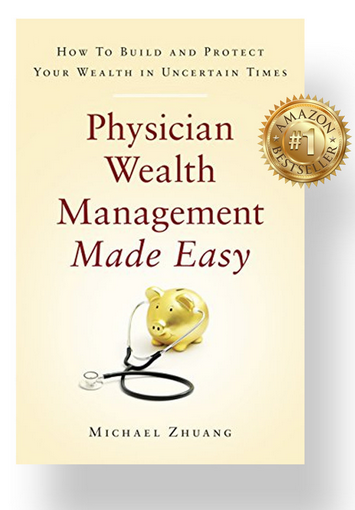We doctors spend years training to take care of patients, but we get little if any financial education.
There is no financial planning or tax strategy rotation in residency. But there should be, because far too many of us discover later on in our careers that not only are we losing sleep over our patients, we’re also awake at night fretting about our financial situations.
While we’re young and eager to get into the thick of patient care, our future finances are the furthest thing from our minds. But the years go by fast, and these days so many doctors move into the later stages of their careers in surprisingly precarious financial shape.
Author Michael Zhuang, seeks to remedy that situation. He is a veteran financial advisor who specializes in helping physicians make solid financial plans. His new book is titled, Physician Wealth Management Made Easy.

Originally a hedge fund manager, Zhuang started working with physicians after his own internist faced tragedy. Zhuang was surprised one day when his long-time doctor called to confide that he had been diagnosed with pancreatic cancer. “Michael,” he said, “my family is totally unprepared for this, not just emotionally, but financially. You’re the only financial guy I know. Can you give us some advice?”
Zhuang helped his doctor’s family stabilize their financial situation. They were able to face the tragedy of losing their husband and father without the additional burden of financial insolvency.
While serving patients is obviously rewarding, it’s also physically and emotionally taxing. And it is literally taxed higher than earnings on capital assets.
Realizing that this was not an isolated phenomenon, and that many medical practitioners (and their families) faced significant financial challenges, Zhuang decided to change directions and focus on helping doctors better manage their money.
“I realized I had made a big difference in the lives of good people. I had helped a man who had helped other people his whole career. And for the first time in my life, I felt that my financial talents were actually needed—that my work could have meaning,” he writes.
Acknowledge the Problem
According to Zhuang, physicians face unique financial challenges even though they usually earn good livings.
The first problem is that many doctors simply don’t know what they are doing when it comes to financial planning and wealth management. Zhuang has worked with hundreds of doctors and estimates that only five percent have the skills to successfully handle the complexities involved in wealth management.
But the bigger problem may be physician pride: because doctors are highly educated and intelligent, it can be hard for them to admit their ignorance.
Doctors also get a late start saving money, and they enter their professional lives with huge student debt—often in excess of $300,000. That means we spend the early part of our careers paying interest instead of earning it. We are therefore less able to take full advantage of compounded savings over time.
The Plague of “PMF”
In general, we doctors also have a high lifestyle expectation. We work hard, and frankly struggle to get by for many years as we work toward the promise of a big payoff in the future. When that future finally materializes, many of us are eager for the large house and the nice cars.
Rather than continuing to live frugally and save, we spend on an expensive lifestyle right away. Zhuang calls this “pent-up monetary frustration—or PMF for short.”
At the same time doctors often fail to see the need for a financial adviser. And those of us who recognize the need often don’t know how to vet a good one—a dangerous situation because doctors are prime targets for dubious financial schemes. We have financial resources but lack commensurate financial know-how.
Along these lines, Zhang quotes legendary investor Warren Buffet:
“When a man with money does business with a man with experience, the man with experience will end up with the money, and the man with money will end up with experience.”
Mindset is Key
What is to be done?
Zhuang makes it clear that mindset is key. He advises that a physician’s mantra be that of working to shift from labor to capital.

Labor is basically trading time, talent, and hard work for financial compensation. Building capital is about owning assets that create passive income. While serving patients is obviously rewarding, it’s also physically and emotionally taxing. And it is literally taxed higher than earnings on capital assets.
Along these lines, Zhuang likes to work initially to help physicians build up an asset portfolio of one million dollars before they start spending on real estate and automobiles.
Throughout the book—which he makes available free of charge to physicians on his website https://mzcap.com/book—Zhuang analogizes fiscal health with physical health, and the role of a financial advisor with that of a physician. He uses terms and phrases that will be immediately familiar to most physicians.
“When a man with money does business with a man with experience, the man with experience will end up with the money, and the man with money will end up with experience.”
—Warren Buffett
Just as working towards a healthy body requires a comprehensive plan involving many interacting systems and processes, financial health requires a similar approach. And all of this, of course, should be evidence-based.
Six Pillars
Zhuang breaks it down into what he calls the, “six pillars of wealth management.” These are: wealth preservation, tax mitigation, asset protection, heir protection, practice succession, and charitable planning.
He believes that a good financial advisor can work much like a primary care practitioner, taking a comprehensive view of the entire process while working on areas where he or she has specific expertise. A good advisor also knows when to call on specialists (tax, law, practice management, etc.) as needed.
Most physicians have likely given at least some thought to retirement savings. But there’s a lot more to financial planning than that. Zhuang explains other key aspects of wealth management that may be unfamiliar or overlooked entirely. For example, he discusses the importance of planning for practice succession—especially for doctors in private practice.
Doctors also get a late start saving money, and they enter their professional lives with huge student debt—often in excess of $300,000. That means we spend the early part of our careers paying interest instead of earning it. We are therefore less able to take full advantage of compounded savings over time.
It often takes five to ten years to fully transition a practice. A financial advisor can help make that process a smooth one.
Cover Your Assets
Another key area we doctors might not fully consider is asset protection.
We all know that we run a high risk of being sued. Zhuang says that young physicians just starting out can count on a staggering 96% chance of being sued at some point during their careers. In the book, he ranks risk of being sued by specialty (neurosurgery tops the list).
We recognize the importance of carrying liability insurance, but how many of us consider other ways to protect our assets in the event of a large judgement? Zhuang offers tips like umbrella insurance that can help mitigate this risk.
As they move towards the end of their careers, many doctors want to contribute financially to charitable causes. Zhuang suggests ways to plan for this early on, when we can take more advantage of the tax savings from charitable giving.
The Bottom Line
Having discussed the need for expert wealth management for physicians, Zhuang concludes with information on how to find a good advisor. He explains the ways financial advisors may (or may not) be trained, and discusses red flags to avoid (spoiler alert: insurance salesmen and stockbrokers are not your friends). He even lays out a series of interview questions a physician should ask a prospective advisor.
We doctors are highly educated, intelligent and well paid. Our skills are unmatched when it comes to taking care of their patients, but many of us are lacking when it comes to managing money. A good doctor helps patients prevent physical problems and a good financial planner helps doctors prevent financial problems. And just like it’s important to catch a health problem early, timeliness in financial matters is key.
END
Grant Jackson, MD, is an integrative family physician and journalist in Salt Lake City, UT, where he directs his own private practice, Jackson Integrative Health. He earned his MD defree in 2005 from the University of Utah, and did his residency training at Washington Hospital. He completed the University of Arizona’s Integrative Medicine Fellowship in 2016. He enjoys fly fishing, skiing, reading, cooking, and time with his wife Julie and their 4 children







